Passengers flying out of S’pore from Oct 2026 to pay extra $1 to $41.60 in green jet fuel levy
Sign up now: Get ST's newsletters delivered to your inbox
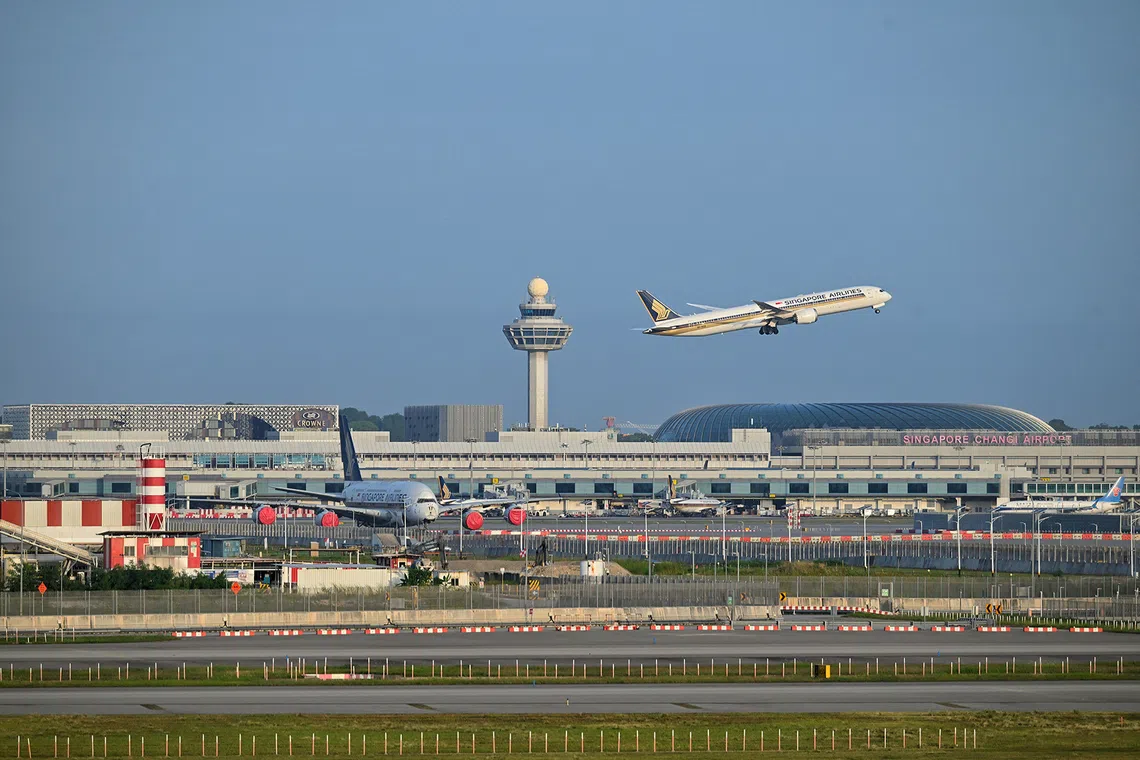
Passengers will pay the fee together with the ticket price, and airlines will be required to state the levy amount as a distinct line item on the air ticket sold.
PHOTO: ST FILE
Follow topic:
- From Oct 1, 2026, Singapore will impose a sustainable aviation fuel levy on departing passengers, levied on tickets sold from April 1, 2026, varying from $1 to $41.60, based on distance and class.
- The levy aims to achieve Singapore's target of sustainable aviation fuel constituting 1% of jet fuel by 2026, with plans to increase to 3-5% by 2030, funded by fees collected.
- A new company, SAFCo, will manage the sustainable aviation fuel supply; the levy will also apply to cargo and chartered flights, but excludes transit passengers and humanitarian flights.
AI generated
SINGAPORE – Passengers flying out of Singapore from October 2026 will pay a levy of between $1 and $41.60 that will go towards the purchase of sustainable aviation fuel.
The levy will apply to tickets sold from April 1, 2026, for flights leaving Singapore from Oct 1 that year, the Civil Aviation Authority of Singapore (CAAS) said on Nov 10.
Passengers in economy or premium economy class will pay between $1 and $10.40, depending on their destination. Those who fly business or first class will pay between $4 and $41.60.
Passengers will pay the fee together with the ticket price, and airlines must state the levy amount as a distinct line item on the ticket sold.
Travellers who fly farther will pay more because longer flights consume more fuel, CAAS said.
Passengers in business or first class are set to pay up to four times more than those in economy class, CAAS said, based on industry norms for calculating the carbon emissions of passengers in different cabin classes.
To apply the levy, destinations worldwide have been grouped into four geographical bands, with the levy amount increasing with each successive band, based on distance travelled:
Band 1: South-east Asia
Band 2: North-east Asia, South Asia, Australia and Papua New Guinea
Band 3: Africa, Central and West Asia, Europe, Middle East, Pacific Islands and New Zealand
Band 4: The Americas
For flights with multiple stops, the levy will be based on the immediate destination after departing Singapore, said CAAS chief sustainability officer Daniel Ng at a press conference on Nov 10.
A passenger in economy or premium economy will pay a levy of $1 for a flight to Bangkok (Band 1), $2.80 to Tokyo (Band 2), $6.40 to London (Band 3), and $10.40 to New York (Band 4).
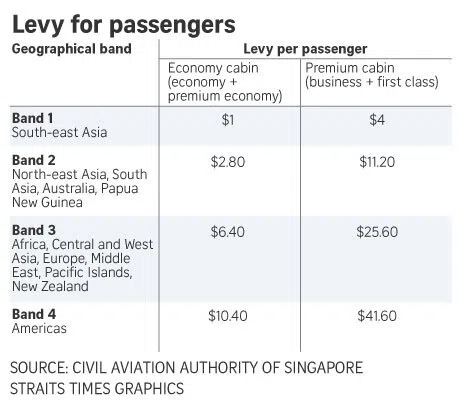
These amounts are lower than initially estimated. CAAS estimated in early 2024
This reflects the lower cost of the green jet fuel compared with when the initial estimates were made.
“Sustainable aviation fuel prices have since moderated,” CAAS director-general Han Kok Juan told reporters at the press conference.
Those who fly business or first class will incur a levy of $4 to travel to Bangkok, $11.20 to Tokyo, $25.60 to London, and $41.60 – the maximum amount – to New York.
Mr Han said the timing of the roll-out – for tickets sold from April 2026 for flights departing from October that year – is based on industry feedback, giving airlines and passengers time to adjust.
The levy will not apply to passengers transiting through Singapore. It will also not be imposed on training flights, and flights for charitable or humanitarian purposes, CAAS said.
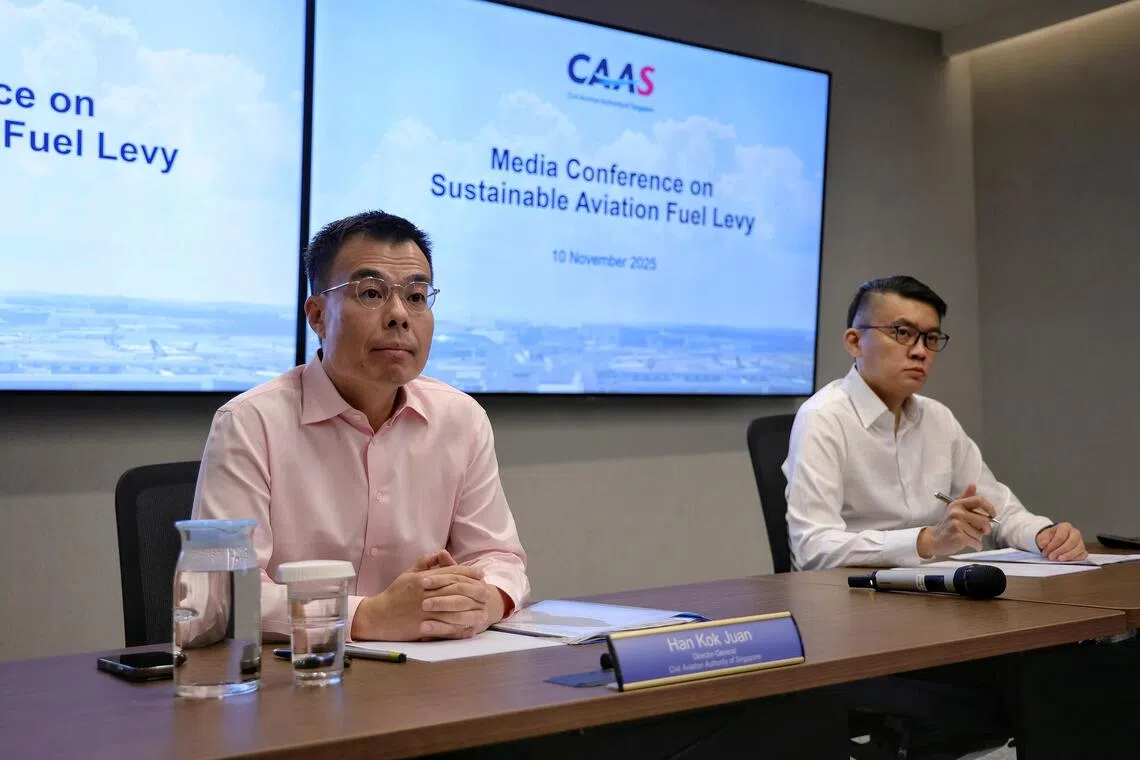
CAAS director-general Han Kok Juan (left) and chief sustainability officer Daniel Ng at a press conference on Nov 10.
ST PHOTO: KEVIN LIM
With the levy applying only to tickets sold from April 1, 2026, Mr Ng said: “If you go out and buy a ticket today, the levy will not apply, even if you travel beyond Oct 1, 2026.”
Levy set to remain at this level for ‘a few years’
Singapore’s target is for sustainable aviation fuel to form 1 per cent of all jet fuel used at Changi and Seletar airports in 2026.
The goal is to raise this target to 3 per cent to 5 per cent by 2030, depending on global developments and the availability of the green jet fuel, which is mostly made from waste materials such as used cooking oil.
It has been deemed the most practical way to decarbonise the aviation industry as it can be blended with jet fuel and used on existing aircraft and refuelling infrastructure without costly modifications.
Mr Han said the levy amount will be fixed for as long as the target remains at 1 per cent. “We expect the levy to remain at this level for a few years,” he said, noting that a review will be done “some years down the road”.
The amount will be relooked only when the current 1 per cent target is adjusted in future, he added.
The cost of sustainable aviation fuel is among the major barriers that have limited its widespread adoption. Such fuel costs about three to four times more than traditional jet fuel.
Mr Ng said the volume of sustainable aviation fuel that Singapore buys will depend on the prevailing prices of such fuel.
“We’ll buy what we can afford... (using) the levy we collect,” he added.
The levy amounts, said CAAS, were calculated based on the volume of fuel needed to meet Singapore’s 1 per cent target for 2026, and the projected price of the fuel.
Mr Han said he is “very confident” that Singapore will be able to secure a supply of fuel to meet its 1 per cent target.
The levy will be applied on top of a total of $65.20 in fees that departing passengers who start their trips at Changi Airport already pay. These fees will go up in stages from April 2027, reaching $79.20 in April 2030 – a 21 per cent rise.
CAAS and airport operator Changi Airport Group said in November 2024 that the increase in fees is necessary to fund infrastructural projects and offset rising costs
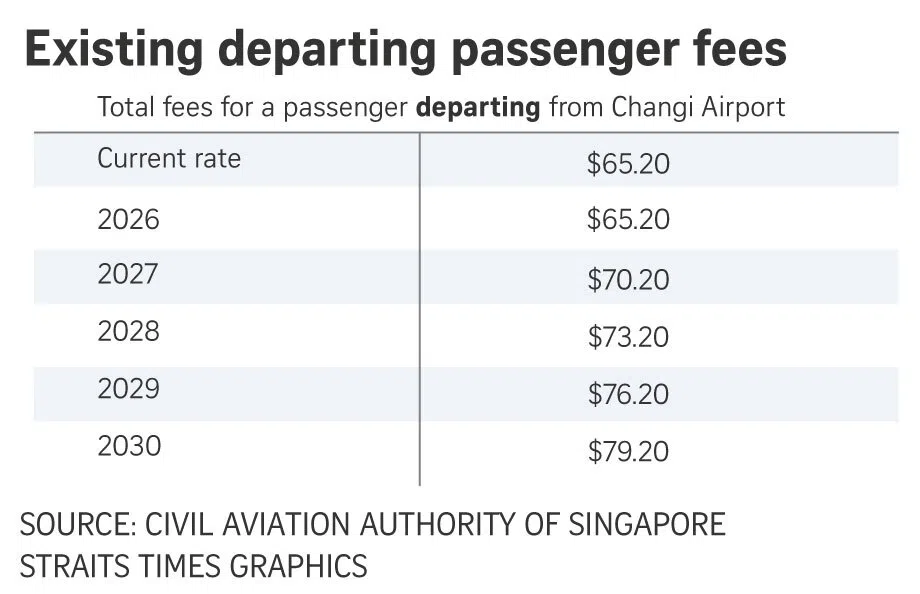
This means that when the levy kicks in, a passenger travelling to New York in economy or premium economy class will pay a total of $75.60 in charges in 2026. A business or first class traveller on that flight will pay $106.80 in all.
Levy also applies to cargo shipments, chartered flights
The levy will also apply to cargo shipments, and general and business aviation flights – such as private jets and chartered services – departing Singapore.
The levy on cargo shipments is calculated on a per-kilogramme basis, and varies based on the distance travelled and according to the four geographical bands.
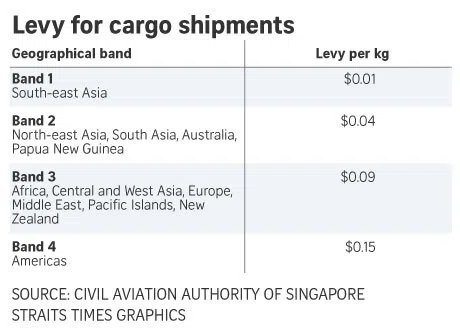
Aircraft operators will collect the levy and must display it as a distinct line item in air cargo contracts.
For general and business aviation flights, the levy is charged on a per-aircraft basis.
It will be determined by the aircraft’s wingspan, which serves as a proxy for aircraft size, CAAS said, and will be tiered according to the same four geographical bands.
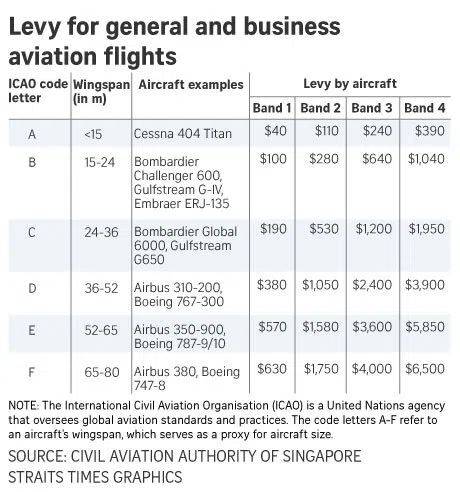
The authority’s announcement on Nov 10 came nearly two weeks after it announced the setting up of the Singapore Sustainable Aviation Fuel Company
SAFCo will use the levy collected from passengers to buy the green jet fuel, which will be blended with traditional aviation fuel and used to refuel planes at Changi and Seletar airports.
Under Singapore’s sustainable air hub blueprint, launched in February 2024, the Republic will work with the aviation industry to reduce domestic aviation emissions from airport operations by 20 per cent from 2019 levels in 2030, and achieve net-zero domestic and international aviation emissions by 2050.


